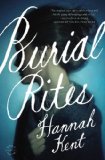Summary | Excerpt | Reading Guide | Reviews | Beyond the Book | Readalikes | Genres & Themes | Author Bio

After they decide I must leave, the Stóra-Borg men sometimes tie my legs together in the evening, as they do with the forelegs of horses, to ensure I will not run away. It seems that with each passing day I become more like an animal to them, another dull-eyed beast to feed with what can be scraped together and to be kept out of the weather. They leave me in the dark, deny me light and air, and when I must be moved, they bind and lead me where they will.
They never speak to me here. In winter, in the badstofa, I could always hear myself breathing, and I'd get scared to swallow for fear the whole room might hear it. The only sounds to keep a body company then were the rustling of Bible pages and whisperings. I'd catch my name on the lips of others, and I knew it wasn't in blessing. Now, when they are forced by law to read out the words of a letter or proclamation, they talk as if addressing someone behind my shoulder. They refuse to meet my eyes.
You, Agnes Magnúsdóttir, have been found guilty of accessory to murder. You, Agnes Magnúsdóttir, have been found guilty of arson, and conspiracy to murder. You, Agnes Magnúsdóttir, have been sentenced to death. You, Agnes. Agnes.
They don't know me.
I remain quiet. I am determined to close myself to the world, to tighten my heart and hold what has not yet been stolen from me. I cannot let myself slip away. I will hold what I am inside, and keep my hands tight around all the things I have seen and heard, and felt. The poems composed as I washed and scythed and cooked until my hands were raw. The sagas I know by heart. I am sinking all I have left and going underwater. If I speak, it will be in bubbles of air. They will not be able to keep my words for themselves. They will see the whore, the madwoman, the murderess, the female dripping blood into the grass and laughing with her mouth choked with dirt. They will say "Agnes" and see the spider, the witch caught in the webbing of her own fateful weaving. They might see the lamb circled by ravens, bleating for a lost mother. But they will not see me. I will not be there.
Reverend Thorvardur Jónsson sighed as he left the church and entered the cool, damp air of the afternoon. Just over one month had passed since he had accepted Blöndal's offer to visit the condemned woman, and he had questioned his decision every day since. Each morning he had felt troubled, as though newly woken from a nightmare. Even as he had made his daily walk to the small church of Breidabólstadur to pray and sit awhile in the silence, his stomach had crowded with nerves, and his body had trembled as if exhausted by his mind's ambivalence. It had been no different today. As he had sat on the hard pew, gazing into his hands, he caught himself wishing that he were ill, gravely ill, so that he might be excused for not riding to Kornsá. His reluctance, and his willingness to sacrifice his own blessed health, horrified him.
It is too late now, he thought to himself as he walked through the rather pitiful garden within the churchyard. You have given your word to man and God, and there is no turning back.
Once, before his mother had died, the church plot had been full of small plants that threw purple blossoms over the edges of the graves in summer. His mother had said that the dead made the flowers sway, to greet the churchgoers after winter. But when she died, his father ripped out the wildflowers and the graves had lain bare ever since.
The door to the Breidabólstadur croft was ajar. As Tóti let himself in, the heavy warmth from the kitchen, and the smell of melting tallow from the candle in the corridor, made him feel nauseous.
His father was bent over the bubbling kettle, poking something with a knife.
"I ought to leave now, I think," Tóti announced.
Excerpted from Burial Rites by Hannah Kent. Copyright © 2013 by Hannah Kent. Excerpted by permission of Little Brown & Company. All rights reserved. No part of this excerpt may be reproduced or reprinted without permission in writing from the publisher.
The library is the temple of learning, and learning has liberated more people than all the wars in history
Click Here to find out who said this, as well as discovering other famous literary quotes!
Your guide toexceptional books
BookBrowse seeks out and recommends the best in contemporary fiction and nonfiction—books that not only engage and entertain but also deepen our understanding of ourselves and the world around us.